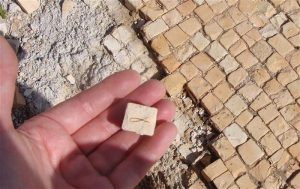Anyone who has visited the Old City of Jerusalem knows that getting an overview of the intricate mosaic of the Christian community and its history in the city is a very difficult task. In recent months there has been an increased focus on the Christian community in Israel. And these reports, which have been quite confusing and at times almost contradictory, add even more complexity to the picture.
On the one hand, the number of Christians registered as residents of Israel has increased significantly in recent years. In a Christmas greeting to Christians in the country, Prime Minister Binyamin Netanyahu said that the Christian community in Israel is “strong and growing” as opposed to other Christian communities in the Middle East. “Israel is proud of its record of religious tolerance and pluralism, and Israel will continue to protect freedom of religion for all. . . . We will continue to safeguard places of Christian worship throughout the country.” He added that Israel “would not tolerate any acts of violence or discrimination against any place of worship. This is not our way, and this is something we cannot accept.”
On the other hand, the past year has been full of reports of violence and discrimination, as well as the continued exodus of Palestinian Christian and Arab Israeli Christian families from the country. Dr. Amnon Ramon’s recently published book, Christianity and Christians in the Jewish State, paints a grim picture of the situation: the number of Christians living in Jerusalem has decreased by more than 50% since 1946. Dr. Ramon asserts that it is hard being a Christian in Jerusalem, and that the community is rapidly diminishing: “The process of decline in the numbers of Christians here is reaching a critical point,” he says. “I’m afraid we might be soon facing a situation of an ‘endangered species’ with regard to these communities.” Recent months have seen an increase in the number of attacks on Christian sites as well as the harassment of clergymen walking through the Old City. Ramon adds: “When an MK [Michael Ben-Ari of the National Union] contemptuously tears up the New Testament while standing at the podium in the Knesset [in response to New Testaments being distributed to Knesset members], why should we be surprised to  see young Jews from the religious right wing setting fire to monasteries or spitting in clergymen’s faces?” These attacks also included so called “price tag” vandalism on church buildings such as the Baptist House and the Monastery of the Cross in Jerusalem. Ramon explains that this is the result of the Jewish Orthodox community’s growing trend of extremism regarding all things Christian: “The Christian issue—presented as a threat to Judaism—has gained a kind of high priority, I would say, sometimes even more acute than [concerns about] the Arabs.” The difficulty most Christians face is the lack of an official policy, on the national level, regarding their status in the city. “Since the dismantling of the Religious Affairs Ministry . . . there is no organized address for the Christian communities living here. Even before the ministry was shut down, though, it was in the hands of the haredi (ultra-Orthodox) Shas party, which didn’t make things easier for the Christians.” Governmental policy seems to range from indifference at best to animosity at worst. This is why so many young (mostly Arab) Christians are leaving the city. As one Armenian Christian told The Jerusalem Post, “What do I have here? . . . For you, the Jews, I am an Arab—an enemy. For the Arabs, I am a Christian, an intruder.”
see young Jews from the religious right wing setting fire to monasteries or spitting in clergymen’s faces?” These attacks also included so called “price tag” vandalism on church buildings such as the Baptist House and the Monastery of the Cross in Jerusalem. Ramon explains that this is the result of the Jewish Orthodox community’s growing trend of extremism regarding all things Christian: “The Christian issue—presented as a threat to Judaism—has gained a kind of high priority, I would say, sometimes even more acute than [concerns about] the Arabs.” The difficulty most Christians face is the lack of an official policy, on the national level, regarding their status in the city. “Since the dismantling of the Religious Affairs Ministry . . . there is no organized address for the Christian communities living here. Even before the ministry was shut down, though, it was in the hands of the haredi (ultra-Orthodox) Shas party, which didn’t make things easier for the Christians.” Governmental policy seems to range from indifference at best to animosity at worst. This is why so many young (mostly Arab) Christians are leaving the city. As one Armenian Christian told The Jerusalem Post, “What do I have here? . . . For you, the Jews, I am an Arab—an enemy. For the Arabs, I am a Christian, an intruder.”
The question that must be asked, then, is how this grim picture relates to the reports of a “strong and growing” Christian community in Israel. One answer would be that in comparison to the Christian community’s situation in neighboring countries, especially following the so-called ”Arab Spring,” the situation in Israel is much to be preferred. After all, there is a large degree of religious freedom in Israel and Christians do not have to fear for their lives. Despite the recent attacks there is protection under the law for Christians, and such attacks are investigated and in some cases lead to prosecutions, although the process may at times be slow and tedious.
Another answer can be found when one looks beyond the simple statistic which compares the number of Christians in the land from year to year. If one takes a look at the demographic changes in the community over the past years an interesting image appears. There is no doubt that the Christian Palestinian/Arab Israeli community is diminishing due to mass emigration of Christians who find life here too difficult as a result of the political situation and economic and social difficulties.
 At the same time, there has been an increase in the number of Christians in the country. This increase is due to the influx of thousands of Russian Orthodox and Ethiopian Christians—Christian members of Jewish families who immigrate under the regulations of the Law of Return. In addition, in recent years there has been a great influx of Christian foreign workers and refugees who are searching for a better life for themselves and their families. Interestingly enough, the highest concentration of Christians can today be found in the poorest neighborhoods of south Tel Aviv, not in Jerusalem. Tens of thousands of Christian migrant workers and refugees live in Israel today (unconfirmed estimates suggest there are as many as 100,000–200,000); the largest group among them are the Filipinos, but there are also Thai people, Indians, Chinese, Sudanese, Eritreans, and others. This community also includes hundreds of children of migrant workers who are born and grow up in this country; they maintain some sense of a “foreign” Christian identity, but at the same time are culturally fully integrated into Hebrew-speaking Israeli secular society while knowing very little about their parents’ faith and cultural background.
At the same time, there has been an increase in the number of Christians in the country. This increase is due to the influx of thousands of Russian Orthodox and Ethiopian Christians—Christian members of Jewish families who immigrate under the regulations of the Law of Return. In addition, in recent years there has been a great influx of Christian foreign workers and refugees who are searching for a better life for themselves and their families. Interestingly enough, the highest concentration of Christians can today be found in the poorest neighborhoods of south Tel Aviv, not in Jerusalem. Tens of thousands of Christian migrant workers and refugees live in Israel today (unconfirmed estimates suggest there are as many as 100,000–200,000); the largest group among them are the Filipinos, but there are also Thai people, Indians, Chinese, Sudanese, Eritreans, and others. This community also includes hundreds of children of migrant workers who are born and grow up in this country; they maintain some sense of a “foreign” Christian identity, but at the same time are culturally fully integrated into Hebrew-speaking Israeli secular society while knowing very little about their parents’ faith and cultural background.
Although much has been said of the growth of the Messianic movement in Israel in the past decades, this growth is quite insignificant in comparison with the growth of these communities of migrant Christians. The great challenge today is that there is very limited contact between these communities and the more established Christian communities in the land such as the Messianic movement and the mainly Arabic-speaking traditional churches.
And although this growth should be a source of encouragement for local Christians, an additional challenge is that these “new” Christians live in this country with only a temporary status at best, and could easily be expelled if the authorities choose to do so. And so this growth could be turned around more or less overnight. It should be mentioned that there is one other country in the Middle East which has seen a similar growth in the Christian community, and that is Saudi Arabia. As in Israel, the growth there is due to the influx of Christian migrant workers.
And so there is good reason to at least look beyond simplified presentations of the Christian community as “strong and growing” and nuance the picture somewhat. At the end of the day, this development constitutes a great challenge to the Messianic movement and the traditional churches in Israel. How can the body of Christ in this land come together in unity despite enormous differences in cultural and theological background, and together seize this time of growth in order to support one another when various parts of the body are under attack or in need, and together live out a common witness of the Lord Jesus Christ? Only time will tell.
Sources:
Quotes and background information for this article are taken from the Caspari Center Media Review; articles published in The Jerusalem Post on October 26 and December 25, 2012; and an unpublished lecture by Rev. Dr. David Neuhaus, SJ, titled “Ecumenism in Israel: The Challenge of the New Christian Communities,” presented on the occasion of the Tantur Ecumenical Institute’s 40th anniversary, October 27, 2012.
This article was has recently been published in Mishkan, issue 71. It is reproduced here with permission of the publisher.